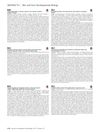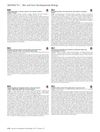 14 citations,
June 2001 in “Endocrinology”
14 citations,
June 2001 in “Endocrinology” Prolactin affects when mice shed and grow hair.
 10 citations,
October 2015 in “Medicina Clínica (english Edition)”
10 citations,
October 2015 in “Medicina Clínica (english Edition)” Recombinant human epidermal growth factor is versatile, effective, and safe for long-term skin and mucosal treatments.
 9 citations,
May 2021 in “International Journal of Dermatology”
9 citations,
May 2021 in “International Journal of Dermatology” The trial showed that a new under-the-tongue treatment for severe hair loss was somewhat effective in a small group of people.
 7 citations,
April 2023 in “Frontiers in immunology”
7 citations,
April 2023 in “Frontiers in immunology” Oral baricitinib and ruxolitinib are effective and safe for treating alopecia areata.
 7 citations,
March 2019 in “Frontiers in Cellular and Infection Microbiology”
7 citations,
March 2019 in “Frontiers in Cellular and Infection Microbiology” Understanding how our bodies interact with mosquito-borne viruses is crucial because there are few treatments and vaccines.
 6 citations,
May 2020 in “Scientific reports”
6 citations,
May 2020 in “Scientific reports” Researchers identified genes and proteins that may influence wool thickness in sheep.
 2 citations,
March 2023 in “Frontiers in medicine”
2 citations,
March 2023 in “Frontiers in medicine” A 15-year-old boy's severe scalp condition improved significantly with adalimumab and baricitinib treatment.
 2 citations,
January 2023 in “International journal of biological sciences”
2 citations,
January 2023 in “International journal of biological sciences” Gray hair can potentially be reversed, leading to new treatments.
 2 citations,
September 2021 in “Curēus”
2 citations,
September 2021 in “Curēus” Tofacitinib may be safe for COVID-19 patients with alopecia without worsening symptoms, based on two cases.
 2 citations,
March 2021 in “Molecular Immunology”
2 citations,
March 2021 in “Molecular Immunology” Dermal macrophages might help regrow hair.
 1 citations,
January 2019 in “Medical principles and practice”
1 citations,
January 2019 in “Medical principles and practice” A boy's hair loss improved after tumor removal and vitamin D treatment, but hair loss returned despite normal vitamin D and no tumor regrowth.
 1 citations,
April 2018 in “Journal of Investigative Dermatology”
1 citations,
April 2018 in “Journal of Investigative Dermatology” Tofacitinib helped most patients with alopecia areata regrow hair and changes in immune cells were linked to the treatment's effectiveness.
 1 citations,
April 2017 in “Journal of Investigative Dermatology”
1 citations,
April 2017 in “Journal of Investigative Dermatology” D-OCT shows increased blood vessel growth in response to tissue damage in Frontal Fibrosing Alopecia and is useful for diagnosis and monitoring.
 February 2024 in “PloS one”
February 2024 in “PloS one” Tofacitinib and adalimumab are promising treatments for cicatricial alopecia with few side effects.
 December 2023 in “Majalah Kedokteran Gigi Indonesia”
December 2023 in “Majalah Kedokteran Gigi Indonesia” Cinnamaldehyde helps bone healing initially but may slow healing later unless combined with DHT treatment.
 December 2023 in “International journal of multidisciplinary research and analysis”
December 2023 in “International journal of multidisciplinary research and analysis” SH-MSCs gel can effectively treat alopecia by increasing IL-10 and decreasing TNF-α gene expression.
 September 2023 in “International Journal of Applied Pharmaceutics”
September 2023 in “International Journal of Applied Pharmaceutics” The formulated gel is a promising treatment for alopecia areata.
 July 2023 in “The Egyptian Journal of Hospital Medicine ”
July 2023 in “The Egyptian Journal of Hospital Medicine ” The conclusion is that emotional support and a variety of treatments are important for alopecia areata, but more research is needed.
 April 2023 in “Medizinische Genetik”
April 2023 in “Medizinische Genetik” New research has found 14 genes linked to the risk of developing alopecia areata, improving understanding and treatment options.
 October 2022 in “Journal of experimental and clinical medicine”
October 2022 in “Journal of experimental and clinical medicine” Repurposing existing drugs for COVID-19 shows promise but requires more research to confirm effectiveness.
 June 2020 in “Journal of Dermatological Treatment”
June 2020 in “Journal of Dermatological Treatment” Use telemedicine and strict hygiene for safe hair and scalp treatments during COVID-19.
 April 2017 in “Journal of Investigative Dermatology”
April 2017 in “Journal of Investigative Dermatology” PRC1 influences skin stem cell development by both turning genes on and off, affecting hair growth and skin cell types.
 April 2017 in “Journal of Investigative Dermatology”
April 2017 in “Journal of Investigative Dermatology” Sirolimus and propranolol may reduce abnormal cell growth and improve lymphatic malformations in children.
 April 2017 in “Journal of Investigative Dermatology”
April 2017 in “Journal of Investigative Dermatology” Blocking JAK-STAT5 signaling in mice leads to hair growth.
 July 2011 in “British Journal of Dermatology”
July 2011 in “British Journal of Dermatology” Dermatologists give better information on pathology forms, hypersensitivity vasculitis is a common skin issue, misdiagnoses can occur, and various skin conditions are linked to loss of elastin or genetic factors.
 April 2024 in “Bioscience trends”
April 2024 in “Bioscience trends” Higher levels of certain DNAs in blood may indicate hair follicle damage in alopecia areata patients.
 2 citations,
September 2022 in “Dermatologic Therapy”
2 citations,
September 2022 in “Dermatologic Therapy” Tofacitinib is a promising treatment for severe alopecia areata, with many patients experiencing complete or partial hair regrowth.
 September 2023 in “JAAD case reports”
September 2023 in “JAAD case reports” A man developed oral hairy leukoplakia while on baricitinib, a medication for alopecia and arthritis, and doctors should watch for such side effects.
 April 2023 in “International Journal of Research in Dermatology”
April 2023 in “International Journal of Research in Dermatology” Baricitinib is a promising treatment for severe alopecia areata with minimal side effects.
63 citations,
July 2018 in “The journal of investigative dermatology/Journal of investigative dermatology” JAK inhibitors can effectively reverse hair loss in people with alopecia areata.





























